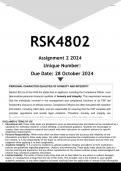RSK4802
Assignment 2 2024
Unique Number:
Due Date: 28 October 2024
PERSONAL CHARACTER QUALITIES OF HONESTY AND INTEGRITY
Section 8(1)(a) of the FAIS Act states that an applicant, including the Compliance Officer, must
demonstrate personal character qualities of honesty and integrity. This requirement ensures
that the individuals involved in the management and compliance functions of an FSP are
trustworthy and act in an ethical manner. Compliance Officers are often entrusted with sensitive
information, including client data, and are responsible for ensuring that the FSP complies with
complex regulations and avoids legal violations. Therefore, honesty and integrity are
foundational traits to ensure that compliance practices are followed without compromise
DISCLAIMER & TERMS OF USE
1. Educational Aid: These study notes are designed to serve as educational aids and should not be considered as a
substitute for individual research, critical thinking, or professional guidance. Students are encouraged to
conduct their own extensive research and consult with their instructors or academic advisors for specific
assignment requirements.
2. Personal Responsibility: While every effort has been made to ensure the accuracy and reliability of the
information provided in these study notes, the seller cannot guarantee the completeness or correctness of all
the content. It is the responsibility of the buyer to verify the accuracy of the information and use their own
judgment when applying it to their assignments.
3. Academic Integrity: It is crucial for students to uphold academic integrity and adhere to their institution's
policies and guidelines regarding plagiarism, citation, and referencing. These study notes should be used as a
tool for learning and inspiration, but any direct reproduction of the content without proper acknowledgment and
citation may constitute academic misconduct.
4. Limited Liability: The seller of these study notes shall not be held liable for any direct or indirect damages,
losses, or consequences arising from the use of the notes. This includes, but is not limited to, poor grades,
academic penalties, or any other negative outcomes resulting from the application or misuse of the information
prov
]
, For additional support +27 81 278 3372
INTRODUCTION
The Financial Advisory and Intermediary Services Act (FAIS Act) in South Africa governs
the regulation and operation of financial services providers (FSPs) and intermediaries. One
of the pivotal positions highlighted by the FAIS Act is the Compliance Officer, who plays a
critical role in ensuring that FSPs adhere to the legal and regulatory frameworks of the
financial services industry. The Act stresses that a Compliance Officer must meet the criteria
of being “fit and proper” to effectively fulfill their responsibilities. Section 8 of the FAIS Act
outlines the key requirements that a Compliance Officer must satisfy to be considered fit
and proper, which include aspects related to integrity, competence, operational ability,
financial soundness, and adherence to the requirements of honesty.
The importance of these fit and proper requirements in the context of risk management
cannot be overstated, as they help mitigate various operational and compliance risks within
the financial services sector. This discussion elaborates on the five fit and proper
requirements outlined in Section 8 of the FAIS Act and their significance in ensuring effective
risk management within an FSP.
PERSONAL CHARACTER QUALITIES OF HONESTY AND INTEGRITY
Section 8(1)(a) of the FAIS Act states that an applicant, including the Compliance Officer,
must demonstrate personal character qualities of honesty and integrity. This requirement
ensures that the individuals involved in the management and compliance functions of an
FSP are trustworthy and act in an ethical manner. Compliance Officers are often entrusted
with sensitive information, including client data, and are responsible for ensuring that the
FSP complies with complex regulations and avoids legal violations. Therefore, honesty and
integrity are foundational traits to ensure that compliance practices are followed without
compromise.
In the context of risk management, having a Compliance Officer who demonstrates honesty
and integrity reduces the likelihood of fraudulent or unethical practices within the
organization. Fraud, corruption, or unethical behavior poses significant risks to FSPs,
potentially resulting in financial losses, reputational damage, and legal penalties. A
Compliance Officer with high moral standards ensures that the organization operates in
accordance with the law and maintains ethical standards, thus safeguarding the business
against these risks.




